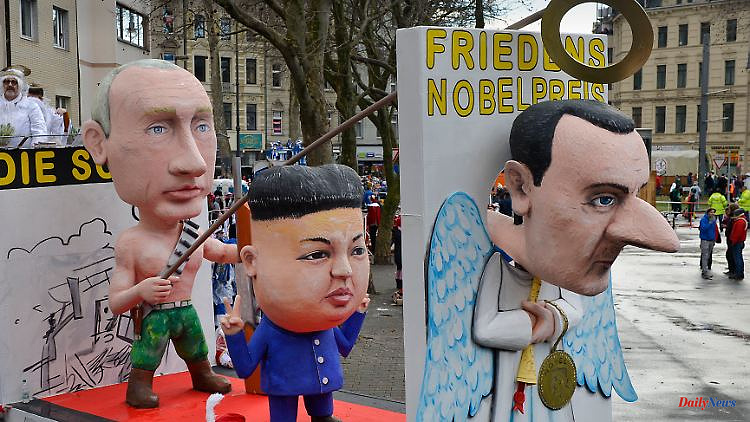Only seven countries are voting at the United Nations against asking Russia to pull out of Ukraine. Moscow's friends are united in their rejection of democracy and human rights, and they are among the most isolated countries in the world. China plays a special role.
Belarus, North Korea, Syria, Nicaragua, Eritrea and Mali - these are Russia's allies on the world stage. At least if you look at the result of the UN resolution on the Russian war of aggression in Ukraine. The six countries, together with Moscow, voted last week against the withdrawal of Russian troops from Ukraine. 32 states abstained. 141 voted to ask Russia to withdraw from Ukraine. 13 countries did not take part in the vote at the United Nations.
The result was very similar to the voting results of the resolutions from last year. In early March, a week after the war began, 141 countries also condemned the Russian invasion of Ukraine. 35 abstained. 5 voted against. In addition to Russia, these were Belarus, North Korea, Syria and Eritrea.
UN resolutions have no meaning under international law, but they do have a high symbolic value. The result of the new vote shows how isolated Russia still is in the world community. The Brics states such as China, India and South Africa have abstained again or are even opposed to Moscow, as has Brazil, which voted in favor of the resolution this time as well.
The Ukrainian Foreign Minister Dmytro Kuleba was subsequently satisfied. "The message is clear: it doesn't matter what and how Russia tries to undermine the international order and Ukraine's coalition of supporters. It fails again and again."
At Russia's side there are now only countries that do not see democracy and human rights so closely and are largely isolated in the world community.
Belarus is Moscow's closest ally. Dictator Alexander Lukashenko has allowed the Russians to attack Ukraine from Belarusian territory. The two countries are very closely linked. Minsk is economically and politically dependent on Moscow. According to the Süddeutsche Zeitung, Russia is even said to be planning to completely take over Belarus by 2030.
The Kremlin wouldn't even have to force this takeover, says political scientist Markus Kaim from the Stiftung Wissenschaft und Politik at ntv. The Lukashenko regime has long been a Russian satellite state. "The situation has been very favorable for the Moscow leadership for several years. Belarus is formally independent. Russia can point to the fact that it is voluntarily under Moscow's spell. This weakens the allegations of imperialism that the West raises." At the same time, the Kremlin can be sure of political and military support from Belarus, adds Kaim.
Syria is also a close and long-standing ally of Russia. Moscow's troops have supported dictator Bashar al-Assad in the civil war in recent years, and entire cities have been bombed by the Russians. Putin helped Assad stay in power. The Syrian ruler's troops now control about two-thirds of the country again. The votes at the United Nations can be seen as a thank you.
One country that is well versed in isolation is North Korea. Russia is one of the few countries that has friendly relations with the Kim regime. Both states even share a 17-kilometer border. Here, too, North Korea's economic dependence is probably a reason for the Kremlin's vote in the UN resolution - and the Kim dynasty's hatred of everything Western.
There are mainly military relations between Russia and Nicaragua. Moscow has soldiers stationed in the Central American country, there are joint military exercises. And dictator Daniel Ortega even signed a decree in the summer that allows the Russians to send even more troops.
The good relations between the two countries go back to the 1980s, when rebels waged a guerrilla war against the left-wing government of Nicaragua. Nicaragua received arms and ammunition from the Soviet Union to put down the rebels. The regime has maintained good contact with Moscow to this day.
After Putin's recognition of the self-proclaimed People's Republics of Luhansk and Donetsk, just before the start of the Russian invasion a year ago, Nicaragua's president had sided with Russia. "President Putin has recognized some republics. Meanwhile, the Ukrainian troops are looking for ways to destroy them, to kill people. But we should remember that Russians live in these areas. Russia wants security," Ortega said, completely taking the stance of the Kremlin.
Eritrea also voted alongside Moscow this time. The bitterly poor country is often referred to as the "North Korea of Africa" because of its isolation. It is demonstratively seeking proximity to other authoritarian regimes in the hope of circumventing Western sanctions. The country is strategically interesting for Russia because of its location on the Red Sea.
As early as March last year, Eritrea voted against condemning Russia's war of aggression. Eritrea abstained from the next resolution in October condemning the illegal annexations by Russia in Ukraine. Now the clear swing to Moscow's side followed again.
As the sixth country, Mali voted for the Russian position for the first time. Relations between Moscow and Bamako have been close for many years. Russian Foreign Minister Sergei Lavrov only visited Mali in February. Russian Wagner mercenaries are deployed on behalf of the military government in Mali. There are reports of massacres that the Wagner soldiers are said to have committed against the Malian civilian population.
Otherwise, the voting behavior of the individual states hardly differs compared to the resolutions in March and October. Compared to the first resolution a year ago, Iraq and Madagascar have now joined the circle of countries condemning the Russian attack on Ukraine. Since the October resolution, the African states of Djibouti, Lesotho, São Tomé and Príncipe and South Sudan have joined, as well as Honduras, Thailand and the South Sea island state of Tuvalu. Bangladesh, Angola, Gabon, Guinea-Bissau and Senegal have gone the opposite way.
China and India abstained each time. But Beijing in particular continues to maintain close ties with Russia. The Chinese government has presented a peace plan that emphasizes the "sovereignty, independence and territorial integrity of all countries". At the G20 meeting in India a week ago, Beijing nevertheless prevented a joint final declaration because it did not want to condemn the Russian war of aggression and did not want to call on the Russians to withdraw their soldiers from Ukraine.
China is now even considering supplying weapons to the Russians. "The United States has recently pointed out that the discourse in China is slowly tilting. Russia has wanted to get weapons from China since the beginning of the war," says political scientist Thomas Jäger in an ntv interview and refers to the visit of the Belarusian ruler Alexander Lukashenko in China. This could play a "major role" in connection with possible arms deliveries from China. "It could be a gateway through which China makes these deliveries. Officially, it will not want to deliver. Beijing is now looking for some way to support Russia under a false flag, so to speak."
It is hardly surprising that China is only indirectly on Moscow's side. Economic relations with the West should not be endangered. That is why Russia has not yet managed to persuade Beijing to vote for Moscow at the United Nations.
That also didn't work out in 2014 after the illegal annexation of Crimea. China also abstained then. Overall, however, the result was significantly lower. 58 countries abstained and 11 voted against Ukraine's territorial integrity. Since then, Russia's circle of friends has shrunk significantly.












